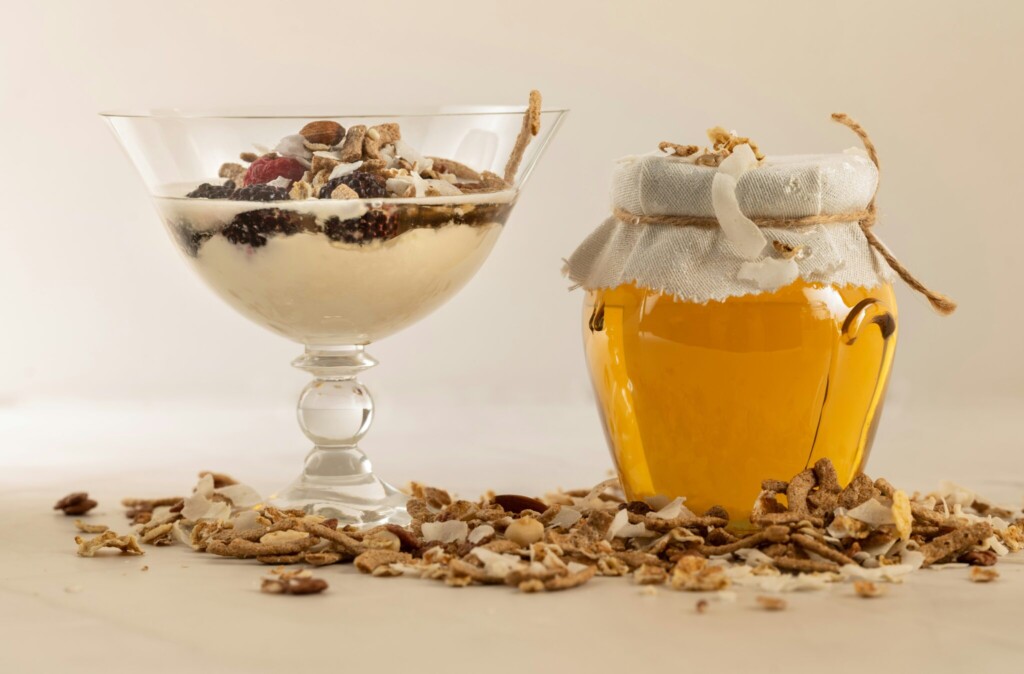
A new study found that adding honey to yogurt helps the beneficial bacteria in the yogurt survive longer in the hostile environment of the GI tract.
It’s just another reason to value the wisdom passed down to us from the classical Greeks, who recognized honey as a medicinal food over 2,000 years ago.
Bifidobacterium and Lactobacillus, two genera of microorganisms that are present in fermented milk products like yogurt, form one of the foundational parts of a healthy gut microbiome. Both kinds have been found to improve bowel function in all stages of digestion from breakdown to absorption to defecation.
It’s never been more important to disseminate this information, since the honey-yogurt study reports that between 10 and 25% of the American population report unsatisfactory bowel function. In other words, for as many as one in every four people in the room, trips to the bathroom are miserable.
“As yogurt with honey is a common food pairing, and honey supports probiotic survival in vitro, we aimed to determine if this functional food combination would enhance probiotic abundance and improve functional outcomes in vivo,” the authors write.
The study had a randomized, controlled, single-blind, crossover design with two 2-week intervention periods. Yogurt beverages were consumed twice daily during each intervention period, with one group consuming theirs with sugar, and the other with clover honey. There was nothing special about the yogurt, and it was in fact a pasteurized, name-brand product with natural vanilla flavoring.
While almost none of their study outcomes were met, it was clear from the results that the in vitro effect reported above carried over in vivo as there was a greater abundance of Bifidobacterium animalis in the stools of those who consumed yogurt with honey rather than just yogurt or yogurt with sugar.
The study also failed to produce evidence that yogurt with honey improved any digestive function, but the authors noted that most of the participants had predominantly normal bowel functions during the trial period, and they suggest that those with dysfunctional activity arising from constipation, IBS, or other complications should be included in future studies on the topic.
“Plain yogurt is fantastic for gut health thanks to its probiotic content,” wrote Chris Kresser MS, co-founder of the California Center for Functional Medicine, who wasn’t involved with the study. “I’m not surprised by these results. Honey (especially raw) is a remarkable food with numerous healing properties. It is truly one of nature’s most potent superfoods.”
NATURE’S WONDER FOODS:
- Eating Baby Carrots 3 Times a Week May Provide Significant Health Benefits
- Eating Pomegranates Can Help Alzheimer’s Patients Alleviate Symptoms, Study Says
- Analysis Strongly Supports Turmeric Supplementation to Improve Arthritis and Osteopenia
- Keep Out All the Christmas Spices – They’re Powerful Antioxidants Known as ‘Nutraceuticals’
- A Hero Ingredient To Help Manage Obesity: The Hardy Roselle Plant
If you go to any Greek restaurant, and you finish polishing off that plate of souvlaki or moussaka, you’ll notice the first two dessert items are always yogurt with honey and walnuts and baklava.
According to a Greek honey shop in Belgium (take that for what it’s worth) Hippocrates, who was a little like the father of Western medicine, “prescribed honey for fever, injuries, and for wound treatment.” Honey was a panacea as far as he was concerned. During the ancient Olympic games, honey became the testosterone of the day, with athletes doping on it to regain their strength between events.
Before expounding on what he learned from his teacher Plato, or what Plato had learned from his teacher Socrates, Aristotle actually wrote his first book on beekeeping.
SHARE This Delicious Science With Your Friends Who Choose Yogurt For Breakfast…




















